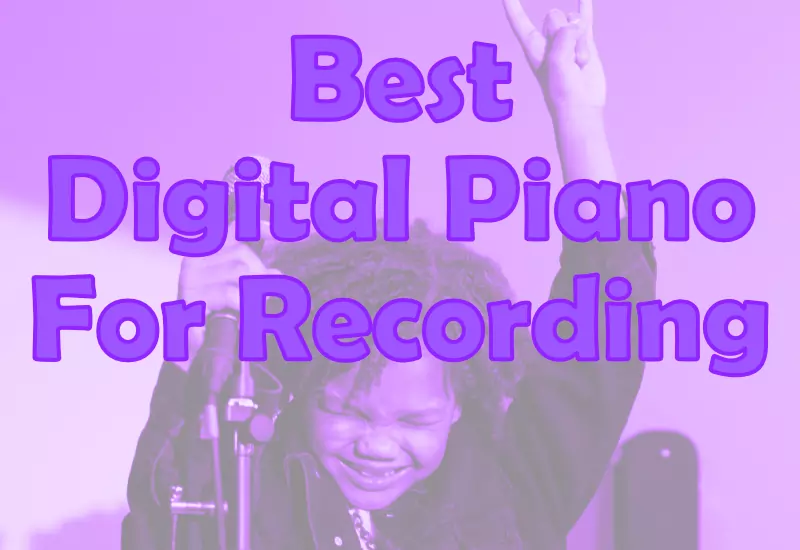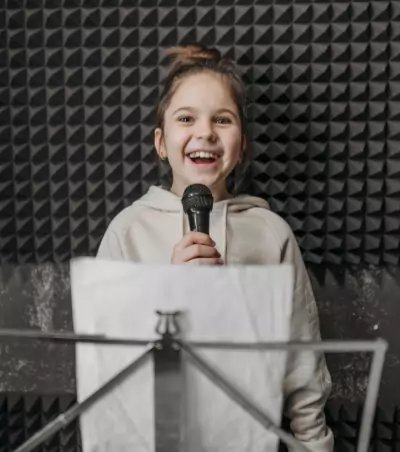Best Digital Piano For Recording

Contents
Choosing the Best Digital Piano for Recording
Aside from letting our children experience social activities is important in developing their personality, interests, and talents. But there is one enriching activity that may also be beneficial to them—learning to play a musical instrument, like a piano. Experts say that most children who engage in music tend to be more successful academically[1]. One of the best ways for your kids to learn and develop a lot for music is by playing the piano. In this article, you will learn how to choose the best digital piano for recording for your kids.
Learn To Play An Instrument
Children learning to play any musical instrument have some advantages, including:
- Music helps in brain development. Studies show that musical training helps in the development of the left side of the brain, the part where language and reasoning are processed.
- Music is a fun activity for kids, especially younger children.
- Music is a good stress reliever.
- Music helps enhance focus and concentration.
- Music is an excellent form of self-expression.
- Music may boost your child’s self-confidence.
- Music helps improve a child’s social skills, particularly if they play in a group or band.
Helping kids discover and develop their talents could probably be the best moments of parenthood. It is ideal for young children to learn music. A guitar or any string instrument may not be a good fit yet for young children and toddlers. The best way for toddlers to develop a love for music is to learn how to play the piano.
Maybe discover a future Michael Bublé or Norah Jones?

Photo by Pavel Danilyuk
You can start your kids early because there are different types of kids keyboard and microphone available in the market today. A good quality children’s keyboard with microphone has a low threshold and is easy to use. Your child can enjoy singing while playing the piano. Your child might also enjoy using other functions of the keyboard. This is ideal for toddlers because kids at that age still have a short attention span. They easily get bored playing with their toys. These children’s keyboards are inexpensive and are the best alternative to the more traditional acoustic piano.
If you want to buy a good quality keyboard and microphone for toddler, look for one that has 24 keys. These toy keyboards are built with little kids in mind and these are sturdy enough, because, you know, kids!
Start your little pop star early by buying your kid the best keyboard piano for recording. Let your child play demo music and record their performance. Your kid can also experiment with making their own tunes, choosing the rhythm they like. These keyboards often feature different sounds and changing lights, making it more fun for small kids. Watch how your child’s eyes light up upon hearing them singing and playing the keyboard.
For older kids, the ideal keyboard of choice is the digital type with 61 keys which can play a few octaves on it. It can also help your child learn the basics of playing a “real” keyboard. It may be a little more expensive than the other types of toy keyboards, but it is a good investment.
Finding the best digital piano for recording can be challenging and overwhelming. Even experienced musicians tend to get confused because of so many choices and factors to consider. Listed below are the most important things you should be aware of before purchasing a digital keyboard for recording.
Digital vs. Acoustic
Related: Check out my short guide on digital vs acoustic pianos
Digital keyboards are different from acoustic pianos, some people prefer the former, and some others prefer the latter. With digital keyboards, the main challenge for engineers is to reproduce these two things accurately: the feel and sound of an acoustic piano.
Strings, keys, and hammers are important elements for an acoustic piano to create sound. Pressing a key, the attached hammer will strike the corresponding string/s, which will then vibrate and create a sound.
In contrast, digital keyboards don’t have strings, while hammers are used just to add weight to the keys and recreate the mechanical movement from the acoustic type. Digital keyboards produce sound with the use of “samples”. A sample is an audio recording of the sound of a musical instrument, or any other sound like the sound of the wind, ocean waves, sirens, etc. Additionally, samples can be excerpts from recorded songs.
Sampling isn’t limited to digital pianos. It is also used for guitars, flutes, electric pianos, drums, organs, and many other instruments. Samples are typically recorded at varying velocity levels (multi-samples) as a response to the way the keys are played from the softest pianissimo to the loudest fortissimo. If the samples are high quality, including the technology used to create and record them, the sound comes out to be more realistic and accurate.
In a professional recording studio using an acoustic piano, manufacturers record each note played at varying volumes with the use of high-fidelity microphones. Roughly, this is the process applied to digital keyboards.
Buyer’s Guide
Digital keyboards usually come with a USB port or line-outs that can be connected to a computer which acts as a hub for most recording studios where the mixing and recording processes happen.
There are options that you need to consider:
Controller Keyboard
If you want to record what your kids play or you are looking for a spare keyboard that you can use in your home studio, consider purchasing a controller keyboard that has 88 weighted keys.
Gigging Artists
You should also get a stage piano or synthesizer with weighted keys which can be used to record music at home. You can make the entire recording and music editing using the keyboard itself. This is the type that is used by performing artists.
Keyboard Players
If your child has already learned to play the keyboards but you’d also want them to learn to play the piano, you can get an 88-keyboard type with arranger-like features. This digital piano has accompaniments and other features useful for recording music.
Practice Piano
If you want to get your child a practice piano for recording, there are brands and models that you purchase for that purpose.
Additional considerations include
- Taking into account the features mentioned above, choose a digital keyboard that can help enhance your child’s skills
- Likewise, look for functionality, like touch response, excellent drum sounds, and a metronome.
- Consider ease of use for your child.
- Consider sound quality. A rich and beautiful sound will motivate your child to play more. Hearing themselves produce beautiful music will inspire them to make more music. The sound should be close to a real acoustic piano.
- Choose a digital piano for recording with built-in lessons that your child can follow. There are digital piano models that come with pre-recorded lessons and an instruction book to serve as a guide. This allows your child to learn the basics of playing the keyboard, including techniques to enhance their skills, even without getting a piano teacher.
Bottom Line
What is the best digital piano for recording? The best choice will keep children entertained while they learn to play music at home. Aside from having the best features for a child to learn to play music, it should be kid-friendly with materials that are harmless to children. The bottom line is that you should find a digital piano that will enhance and develop your child’s love for music.
As of today, I’m not able to recommend one single unit. If you can, let me know by contacting me.
Parents, Teachers & Sheet Music Seekers:
If I offered to provide you hundreds of legit sheet music PDFs for your kids:
- Brand-New & Exclusive Compositions
- Age & Level Appropriate
- With INSTANT Online Access
- Worry-FREE Licensing & Copyright
...would you take me up on that offer?
ABOUT
I started Music4Kids with a simple goal in mind: To provide valuable information to guiding parents who want to raise musically inclined kids.
Click to read on